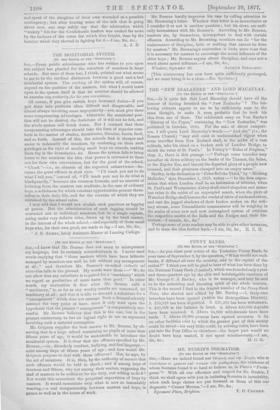[TO Tee EDITOR OF THE "SPECTATOR.") Sm,—I know that Mr.
Bourne does not mean to misrepresent my language, but he certainly misunderstands it. I never used words implying that "those matters which have been hitherto managed by monitors can well be left without any management at all ;" and therefore Mr. Bourne's so-called reductio ad absurdum falls to the ground. My words were these :—" We do not allow that any substitute is rcquircd for a ' machinery ' which we regard as productive of more harm than good." In other words, my contention is that what Mr. Bourne calls a "machinery," is, so far as any worthy results are concerned, no machinery at all ; and that it is idle to demand a substitute for a " management " which does not manage. Such a demand adroitly assumes the very point at issue, since it only rests upon the hypothesis that the present " management " is comparatively suc- cessful. Mr. Bourne believes that this is the case, but in the present controversy he has no logical right to use an argument involving such a material assumption. Mr. Grignon supplies the best answer to Mr. Bourne, by ob- serving that in a large school containing no pupils of more than fifteen years of age, it would be undesirable to introduce the monitorial system. It is clear that the offences specified by Mr. Bourne,—viz., disorderly conduct, bullying, and foul language,— exist among boys of fifteen years of age ; and how would Mr. Grignon propose to deal with these offences? Not, he says, by the aid of monitors. It is, then, by the authority of masters that such offences would be held in check ; and if among boys of fourteen and fifteen, why not among their seniors, supposing the staff of masters to be sufficient for the duty, and willing to do it? Nor would this necessitate the perpetual supervision of boys by masters. It would necessitate only what is now so lamentably wanting,—a real companionship between masters and boys, in games as well as in the hours of work. Mr. Bourne hardly improves his case by calling attention to Mr. Browning's letter. Whether that letter is as inconclusive as I consider it or not is another question ; but its views are radi- cally inconsistent with Mr. Bourne's. According to Mr. Bourne, masters are, by themselves, incompetent to deal with certain offences. According to Mr. Browning, monitors can do "for the maintenance of discipline, little or nothing that cannot be done by masters." Mr. Browning's contention is little more than that it is necessary for masters to encourage the moral influence of the older boys ; Mr. Bourne argues about discipline, and says not a. word about moral influence.—I am, Sir, 8sc., [This controversy has now been quite sufficiently prolonged, and we must bring it to a close.—En. Spectator.]


































 Previous page
Previous page